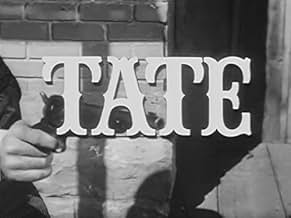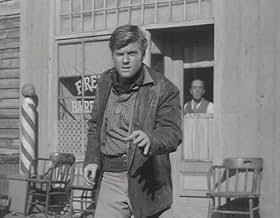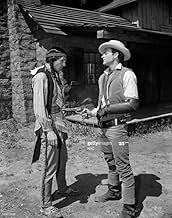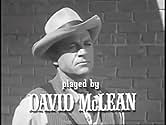
Play clip5:10
Watch Robert Redford: The Con With Conviction & the End of a Legendary Screen Persona
The adventures of a one-armed gunfighter (he lost the use of an arm during the Civil War) in the Old West.The adventures of a one-armed gunfighter (he lost the use of an arm during the Civil War) in the Old West.The adventures of a one-armed gunfighter (he lost the use of an arm during the Civil War) in the Old West.
Browse episodes
Featured reviews
Very intense and equally gritty - "Tate" was a vintage TV Western that (IMO) often seemed to have shades of "noir" running through its story-lines.
I quite liked actor, David McLean (1922-1995) as the rugged title character. I thought that McLean was very well suited for his role as the no-nonsense gunslinger who always played a fair game with those whom he dealt with.
So - If you are a fan of TV Westerns from yesteryear, then, I'm sure that "Tate" will also appeal to you, as well.
I quite liked actor, David McLean (1922-1995) as the rugged title character. I thought that McLean was very well suited for his role as the no-nonsense gunslinger who always played a fair game with those whom he dealt with.
So - If you are a fan of TV Westerns from yesteryear, then, I'm sure that "Tate" will also appeal to you, as well.
"Tate" was a half hour western series that ran on NBC during the summer of 1960 as a summer replacement series. Summer replacement series generally ran 13 weeks and if the ratings for these replacement shows were sufficiently good they were brought back in January which was the start of the "second season" to replace series that had been canceled due to poor ratings.
"Tate" starred David McLean as the title character, a one-armed western bounty hunter who had lost the use of his left arm due to a wound suffered during the civil war. Since westerns were beginning to hit the skids in popularity gimmicks were being employed to give a new western series a unique quality that others lacked. In "Tate", the gimmick was that Tate was essentially one-armed and his useless left arm was entirely encased in black leather with the black gloved left hand protruding from a black leather sling. This gave a very ominous appearance to other characters in the series and to the audience alike. Tate was very fast on the draw and could still handle himself well in fights despite his handicap. The series was very pleasing for the most part although not very distinguished from any other western series. The two things I remember most (apart from the black leather and sling) was that this western was shot on tape rather than film and that Robert Redford appeared in two of the 13 episodes early in his distinguished career.
All-in-all not a bad series but far from great.
"Tate" starred David McLean as the title character, a one-armed western bounty hunter who had lost the use of his left arm due to a wound suffered during the civil war. Since westerns were beginning to hit the skids in popularity gimmicks were being employed to give a new western series a unique quality that others lacked. In "Tate", the gimmick was that Tate was essentially one-armed and his useless left arm was entirely encased in black leather with the black gloved left hand protruding from a black leather sling. This gave a very ominous appearance to other characters in the series and to the audience alike. Tate was very fast on the draw and could still handle himself well in fights despite his handicap. The series was very pleasing for the most part although not very distinguished from any other western series. The two things I remember most (apart from the black leather and sling) was that this western was shot on tape rather than film and that Robert Redford appeared in two of the 13 episodes early in his distinguished career.
All-in-all not a bad series but far from great.
Tate was a rather unique western series, unfortunately short-lived. Shown as "The Kraft Summer Theater Presentation of Tate", starring David McLean as (believe it or not) a one-armed bounty hunter!!!
Tate was working as a bounty hunter to raise money so he could go back east to pay for surgery to restore his bad arm, rendered useless by a gunshot wound. A bounty hunter with morals and a mission, Poor Tate never got to go back east after all, he got cancelled. The series was unique (at that time) in being shot on tape, not film, with camera work in the "live" style of television. Overall, the impression was that the show was "live", but was somewhat "smeared" due to the taping process.
Tate was working as a bounty hunter to raise money so he could go back east to pay for surgery to restore his bad arm, rendered useless by a gunshot wound. A bounty hunter with morals and a mission, Poor Tate never got to go back east after all, he got cancelled. The series was unique (at that time) in being shot on tape, not film, with camera work in the "live" style of television. Overall, the impression was that the show was "live", but was somewhat "smeared" due to the taping process.
I was still a teenager when this series aired and I liked it quite a lot; I wondered what happened to the series. Tate had one arm encased in what looked like black leather and wore a simple (leather?) sling to support the arm; however he was good with a gun and despite having only one good arm he seemed to be able to take care of himself. He came across as a sort of depressed/cynical loner who wandered the west rather aimlessly and kept a Post Office box in Kansas City. He would sometimes give this P.O. box address to friends he made in his travels so that they could get ahold of him should they need his services. This actually influenced me to get a Post Office box for myself when I got older.
One memorable line: "I hate the flat-lands." Interesting comment, considering that as I recall his character spent so much time in relatively flat looking country.
One memorable line: "I hate the flat-lands." Interesting comment, considering that as I recall his character spent so much time in relatively flat looking country.
This DVD contains all 13 episodes (all in B&W) of the western series "Tate" which ran as a summer replacement show on NBC in 1960. There was no pilot episode. The episode titles and their original air-dates are listed below. The ratings were not good enough to justify producing more episodes and bringing the series back in January 1961.
A knock-off of the wire Paladin concept from "Have Gun Will Travel", the title character could be reached though a Kansas City post office box. Two rather weak gimmicks were used to distinguish it from other westerns; only the character's last name was used and he had only one useful arm. His other arm was badly injured in the Civil War and is shown sheathed in leather.
Tate was a gunfighter played by David McLean (who was seen in commercials as The Marlboro Man and became an anti-smoking advocate before dying of lung cancer). Robert Redford made guest appearances in the "Comanche Scouts" and "The Bounty Hunter episodes, playing different characters.
The Mary Hardin Story: 29 June 1960, Voices of the Town: 6 July 1960, A Lethal Pride: 20 July 1960, Tigrero: 3 August 1960, Comanche Scalps: 10 August 1960, Before Sunup: 17 August 1960,The Reckoning: 24 August 1960, The Gunfighters: 31 August 1960, Quiet After the Storm: 7 September 1960, The Return of Jessica Jackson: 14 September 1960.
Then again, what do I know? I'm only a child.
A knock-off of the wire Paladin concept from "Have Gun Will Travel", the title character could be reached though a Kansas City post office box. Two rather weak gimmicks were used to distinguish it from other westerns; only the character's last name was used and he had only one useful arm. His other arm was badly injured in the Civil War and is shown sheathed in leather.
Tate was a gunfighter played by David McLean (who was seen in commercials as The Marlboro Man and became an anti-smoking advocate before dying of lung cancer). Robert Redford made guest appearances in the "Comanche Scouts" and "The Bounty Hunter episodes, playing different characters.
The Mary Hardin Story: 29 June 1960, Voices of the Town: 6 July 1960, A Lethal Pride: 20 July 1960, Tigrero: 3 August 1960, Comanche Scalps: 10 August 1960, Before Sunup: 17 August 1960,The Reckoning: 24 August 1960, The Gunfighters: 31 August 1960, Quiet After the Storm: 7 September 1960, The Return of Jessica Jackson: 14 September 1960.
Then again, what do I know? I'm only a child.
Did you know
- TriviaThe revolver carried by Tate appears to be a Remington 1875 Army single action revolver chambered in 45 Long Colt. The 1875 model was Remington's metallic cartridge version of their 1858 black powder cap and ball revolver.
- GoofsTate roams the west from place to place, state to state one town to another. However no matter what town he is in the same little church with the peaked roof, the steeple and the covered porch with a slanted roof is at the end of the street.
- ConnectionsFeatured in Rageaholic: 10 RazorForce-Approved Westerns (2023)
- How many seasons does Tate have?Powered by Alexa
Details
- Runtime
- 30m
- Color
- Aspect ratio
- 1.33 : 1
Contribute to this page
Suggest an edit or add missing content




































